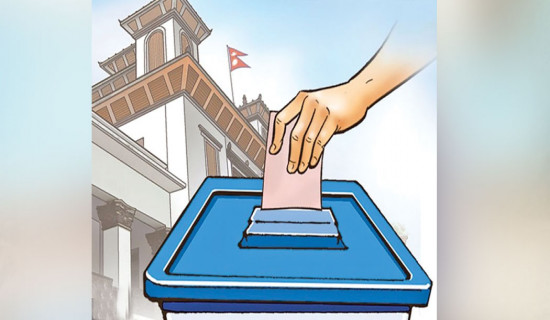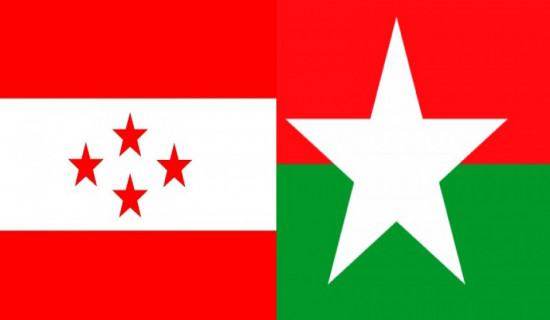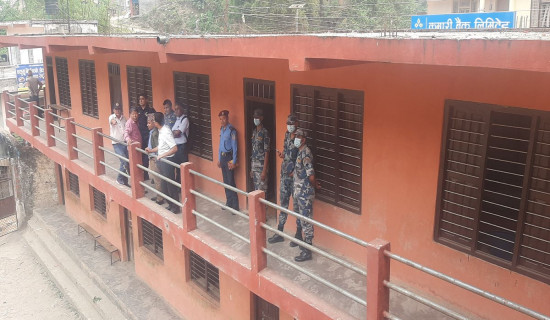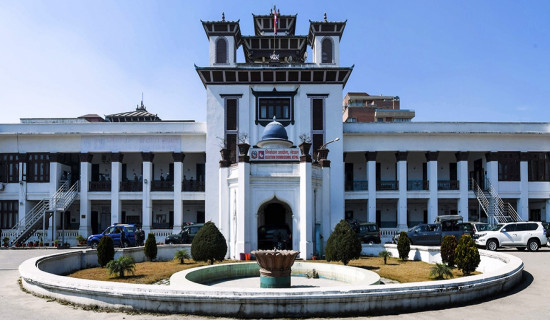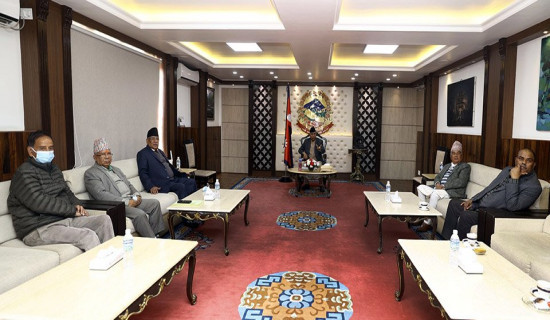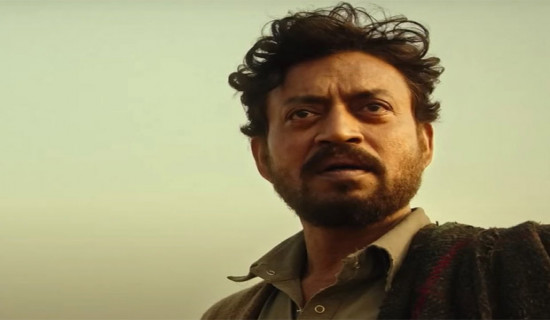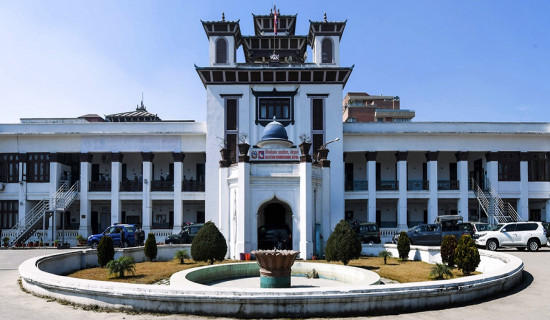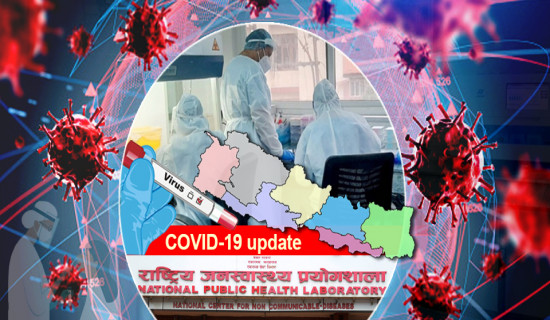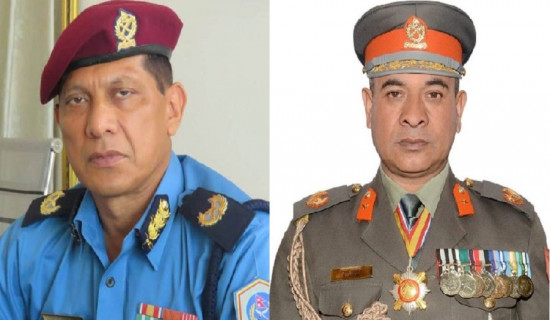- Saturday, 6 September 2025
10 candidates elected unopposed in local polls in Taplejung
Ten candidates have been elected unopposed in local-level election in Taplejung.
Electoral alliance between NC and JSP at Palungtar municipality
An electoral alliance has been made formed between the Nepali Congress and Janata Samajbadi Party at Palungtar municipality in Gorkha district.
MCC Compact published in Nepal Gazette
The Millennium Challenge Corporation (MCC) Compact has been published in the Nepal Gazette, the government's official bulletin. With this, the project considered a milestone in the development of the energy and infrastructure sector of Nepal has formally come into the implementation process.
Gulmi district security committee intensifies inspection of polling stations, centers
A team led by Chief District Officer (CDO) Punya Bikram Paudel reached different places on Sunday including Kaligandaki and Satyavati Rural Municipalities to inspect the security situation for the poll.
Ballot papers for local polls sent to 60 districts to date
Kamal Gyawali, assistant secretary at the Election Commission (EC), Nepal, said that the ballot papers for the remaining 17 districts will be distributed soon.
'Don't post misleading contents about polls on social media'
Shaligram Sharma Paudel, EC spokesperson and joint secretary, said at the press meet that those failing to follow the EC directives will face action as per the laws.
Ruling coalition directs partners to go in election with unity spirit
The meeting held today of the coalition mechanism for making internal preparation and monitoring of the local level election has decided to take action against the candidates who filed rebel candidacies against the common candidate nominated by the coalition.
International Workers' Day: Daily wagers struggling to survive
Bishnu BK, who works at a transportation job, has fallen on hard times to support himself and his family with the limited money he earned as a daily wager. He is struggling to support his four-member family through the wages he got from his job.
When Irrfan Khan was attacked by a buffalo on the outskirts of Jaisalmer
Irrfan Khan, who passed away two years ago, on April 29, 2020, delivered several memorable performances in his illustrious career. However, for many moviegoers, his performance in Anup Singh’s Qissa (2015) ranks as one of his best. Irrfan Khan, too, was happily working with the talented director and both collaborated again on The Song Of The Scorpions (2017).
Ballot papers remain to be sent to 17 districts only
Ballot papers for this May 13 local level election remain to be dispatched to only 17 districts so far.
Local elections in statistics
A total of 153,220 candidacies have been registered for the upcoming local level elections slated for May 13. The nation will be holding the second local elections for six metropolises, 11 sub-metropolises, 276 municipalities, 460 rural municipalities and 6,743 wards since it entered the federal system.
Fiscal Health Space in Nepal
Fiscal Health Space in NepalGauri PradhanHealth is a fundamental human right of people as per the UN Declaration on Human Rights. The constitution of Nepal, 2015 also ensures fundamental health rights, emergency health services and equal access to health services for all. Therefore, providing primary health facilities to people and protecting their health rights is an essential obligation of the state. However, seen from astand point of the present healthcare coverage and the burden of health expenses of the people, Nepal is posed to encountering a difficult road ahead.According to WHO, health financing is a core function of health systems that enables progress towards universal health coverage by improving adequate services and financial protection of people. However, in Nepal, people spend a big chunk of their income to meet their healthcare needs. Unfortunately, millions of people in Nepal are deprived of essential healthcare services.Consequently, poor and vulnerable people are falling further into the poverty trap due to the rising health expenses, particularly during their illness. Therefore, Nepal needs to appropriately review its health coverage status and extend the fiscal space for healthcare services to respond to the dire needs of people's health issues. An international study reveals a need for 86 USD per capita investment in the health field of low-income countries like ours. But, Nepal's per capita investment in health is meagre, and it is only about 20 USD. Statics reveal that the general government expenditure on health shares only 4% of the public budget. The out of pocket expenditure of an individual in healthcare is about USD 57.2 per cent despite the government's budget allocation of NPR 4.8 billion in FY 2021/22. In the face of having a glorious vision of "prosperous Nepal and happy Nepali", the development practice in the country is not people-oriented nor economically sustainable and environmentally friendly. Government priority is focused on "Bulldozer Development", such as building concrete urban jungles, river exploitation, road construction without proper socio-economic analysis, constructing mega airports damaging the environment and eco-system, building view towers and big gates instead of giving priority to public goods like health, education and social security. The so-called "Rashtriya Gaurawka Aayojana" (national pride projects) also lacks a concrete vision and appropriate analysis for social empowerment, the masses' economic growth, and environmental protection. There is a close association between the general population's health and overall development. Experiences have proved that no national security is conceivable without proper human protection. In 2001, when the world entered into MDG era, Nepal also increased its budget to meet the declared health targets. To meet the Sustainable Development Goals (SDGs) 2030, the government has further expanded the fiscal space of the health sector. As a result, Nepal has progressed significantly in terms of prevention and control of Infant Mortality Rate (IMR), Under Five Mortality Rate (U5R), and Maternal Mortality Rate (MMR) and in life expectancy of people. Nepal has also has extended financial schemes to support the poor and vulnerable people in treating non-communicable but life-threatening diseases such as cancer, dialysis and TB. However, the health system in Nepal faces profound challenges related to the fair distribution of healthcare services. People, in general, are complaining that they are suffering from increasing healthcare expenses due to a lack of good public health service in the country. Inadequate health budget allocation, poor administration, and ineffective health service system monitoring are also crucial challenges in Nepal. Generally speaking, the government's economic policies are focused on the growth paradigm. Still, unequal growth and lack of a proper social security system have also contributed to growing pains at people's level. From the perspective of growth-based economics, the state's investment in health, education, and social security is a deficit. But, the government cannot go for a paradigm shift by handing over these "state burdens" to the market economy just to collect the taxes to meet the health finances. The state should not forget that the invisible cost of people's illness and lack of proper health services will be an enormous burden in the long run if the issues are not tackled in time. Hence, the government must focus on meaningful investment in promoting and protecting people's health, which matters significantly for the country's national development. UNICEF reveals that an investment of one USD in child vaccination is equivalent to the return of sixteen USD. Similarly, a little investment in the capacity building of midwives also can save thousands of pregnant women and newborn babies during the delivery. There has been a substantial financial deficit to enhance the accessibility, affordability and quality of health services for people living and working under challenging circumstances. In Nepal, the National Health Policy covers programmes including vaccination, family planning, birth preparedness, free delivery services, abortion care, and community post-partum care to benefit society's marginalised and vulnerable people. The government receives a considerable amount of international grants and soft loans in this regard. Healthcare management, including public hospitals in the country, is below satisfaction. On the one hand, people are forced to go to private set-ups for better healthcare services even by lending money, on the other hand, the affluent population spends billions of NRs abroad to get treatment for speciality and super-speciality health services. Traditionally, the government has been hugely taxing the production, import and sale of alcohol, tobacco-related products, vehicles and luxurious goods. Likewise, the government has also been expanding its sources of health budget by taxing services related to communication, drinking water, electricity and transportation. But this has also put a further burden on commoners. Therefore, the government needs to explore additional sources to expand the fiscal space of healthcare services. The government also needs to extend its partnership with the Non-Profit Organisations (NPOs), CBOs and cooperatives working in the health sector and promote corporate social responsibility (CSR) to meet the national health goals. During a health crisis, government and NPOs can campaign for cloud funding. Development assistance can also be regarded as a reliable source of revenue for the government, alongside taxation. Besides, issues like governance, transparency and accountability of the healthcare programmes need to be appropriately addressed to further attract international financing and public trust in the government policies and programmes. Generally speaking, there are basically three significant health financing functions: re-prioritising expenses, increasing sources of revenues and enhancing service efficiency in the health sector. Besides, there should be an appropriate budget planning for the per-unit cost of essential healthcare services based on the size of inhabitants, remoteness, the burden of disease, and the degree of poverty. The government-funded programmes such as safe motherhood, under-privileged citizen health treatment and social health security need to continue to facilitate easy access to healthcare services. Due to their vulnerabilities, the poor and vulnerable people must be supported to respond to their health emergencies. If we could introduce proper social security plans and health care schemes, they could also further enhance the health response capacity of the people and the government. Gauri Pradhan is a former member of the national human rights commission (NHRC) and associated with Public Health Concern Trust (phect-NEPAL).
18 new cases, 27 recoveries in 24 hours
In 2,508 Real-Time Polymerase Chain Reaction (RT-PCR) tests done in the past 24 hours, a total of 18 persons were found infected with SARS-CoV-2, informed the Ministry of Health and Population (MoHP) in its regular update.
Man killed by tiger in Chitwan, youth injured in rhino attack
The incident occurred at 8 am this morning while Dahal was on the way for collecting fodder at Rapti Grass Field.
Singh appointed IGP, Aryal APF Chief
The government has appointed Dhiraj Pratap Singh as the 29th Inspector General of Nepal Police. A cabinet meeting held on Sunday decided to appoint Additional Inspector General Dhiraj Pratap Singh as Inspector General of Nepal Police.


